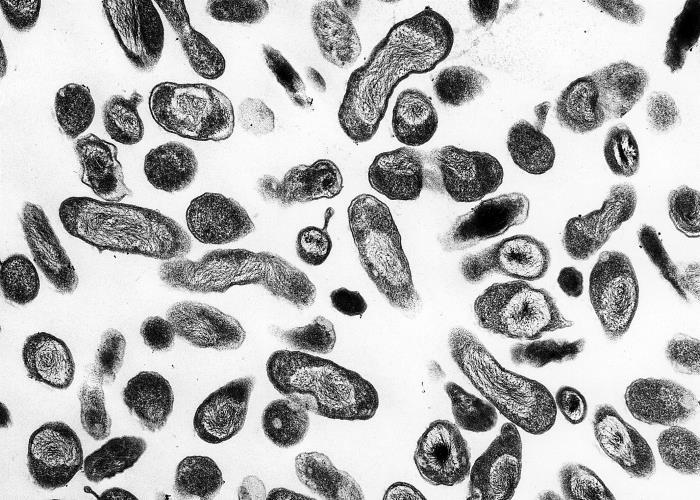
Credit: National Institute of Allergy and Infectious Diseases (NIAID); Rocky Mountain Laboratories, NIH
- California Study Warns Obscure Q Fever a Bigger Threat Than Once Believed
- In Bolivia, Mass Treatment Associated with Near Elimination of Parasitic Worm Disease
California Study Warns Obscure Q Fever a Bigger Threat Than Once Believed
Chronic disease and deaths from infections with Q fever, a little-known disease caused by a bacterium carried by livestock, may be far more likely than previously believed, according to a new study in Southern California published today online in the American Journal of Tropical Medicine and Hygiene.
Researchers from Loma Linda University examined the experience of patients who were diagnosed with acute Q fever at their hospital between 2000 and 2016. They found that of 20 patients who had acute disease, three went on to develop chronic Q fever and two died. Acute cases of Q fever are often mild, with just flu-like symptoms, and treatable with antibiotics. But the study notes chronic cases can cause dangerous heart and blood vessel infections and have a poor prognosis.
While they were looking at a relatively small number of infections, the scientists found a much higher proportion of patients with acute illness progressing to chronic Q fever and a higher case fatality rate than the national average. They note that while other studies have found cases of Q fever rarely progress to chronic infection, in their study 15% of acute cases worsened to chronic infections. And the 10% case fatality rate in their study was five times the rate (2%) for Q fever cases reported to the U.S. Centers for Disease Control and Prevention.
But they note their study is probably not capturing the total number of infections in their region because many people infected with the bacterium don’t get sick enough to seek treatment. They also point to a lack of international consensus on distinguishing acute from chronic infections and evidence that there may be different types of chronic infections, with some more likely to produce deadly heart problems than others.
Q fever infections can be caused by either direct contact with livestock that harbor the bacterium Coxiella burnetii or by inhaling bacterial spores that can be carried long distances by dust and wind. The patients in the study lived in an area of Southern California where dusty, dry, windy conditions form an “ideal climate for the propagation and spread of the disease,” the researchers said. The study cites previous research finding that Q fever is underdiagnosed and under-reported in the U.S.
Abstract (embargoed until 5 p.m. EDT May 20): https:/
In Bolivia, Mass Treatment Associated with Near Elimination of Parasitic Worm Disease
Wielding an affordable, safe, and effective drug, the Bolivian Ministry of Health has used a mass drug administration (MDA) campaign to all but eliminate a debilitating human infection from a parasitic worm in a region where it was once found in up to a quarter of the population, according to a new study.
Researchers from Bolivia’s FUNDERMA, Institute of Health and Environment, and SEDES La Paz found infections with human fascioliasis, a condition caused by ingesting a parasitic worm that contaminates fresh water and freshwater plants, were practically undetectable following an eight-year MDA campaign with triclabendazole, which is lethal to the worms.
The authors of the study initially had planned to conduct a treatment trial in Bolivia’s Altiplano (high plain) region to further explore the effectiveness of triclabendazole against the Fasciola hepatica worms, also known as liver flukes. This region bordering Lake Titicaca is believed to have the world’s highest rate of human fascioliasis infections, which start out causing fever and abdominal pain before progressing to a chronic condition that can produce nausea, jaundice, and bacterial infections. But the scientists say they were surprised when they “found it impossible to identify sufficient subjects.” In one area, where in 1999 about 27% of the population was infected, in 2017 only 0.7% was infected.
The study could find no other examples of using a mass treatment strategy–in which all accessible members of a large population are treated regardless of symptoms or signs of infection–with triclabendazole to combat fascioliasis. The researchers note that, by contrast, the traditional strategy worldwide has involved diagnosis via stool samples followed by treatment of those infected. But they note that the Bolivian government’s mass treatment strategy in communities at high risk of infection was much less costly and much more efficient and effective.
###
About the American Society of Tropical Medicine and Hygiene
The American Society of Tropical Medicine and Hygiene, founded in 1903, is the largest international scientific organization of experts dedicated to reducing the worldwide burden of tropical infectious diseases and improving global health. It accomplishes this through generating and sharing scientific evidence, informing health policies and practices, fostering career development, recognizing excellence, and advocating for investment in tropical medicine/global health research. For more information, visit astmh.org.
About the American Journal of Tropical Medicine and Hygiene
Continuously published since 1921, AJTMH is the peer-reviewed journal of the American Society of Tropical Medicine and Hygiene, and the world’s leading voice in the fields of tropical medicine and global health. AJTMH disseminates new knowledge in fundamental, translational, clinical and public health sciences focusing on improving global health.
Contact:
Bridget DeSimone, +1 301.280.5735, [email protected]
Preeti Singh, +1 301.280.5722, [email protected]
Media Contact
Bridget DeSimone
[email protected]




